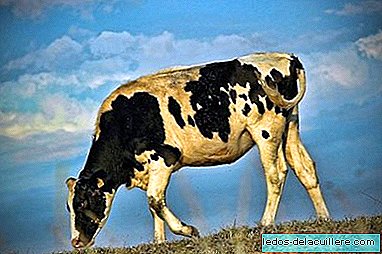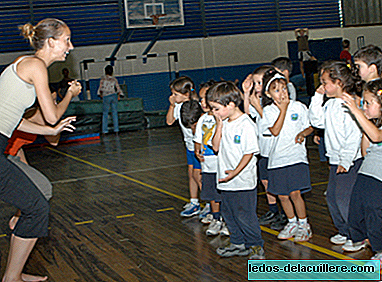
Two years ago Chinese scientists announced that they had genetically modified some cows to give breast milk. They explained that they had managed to get milk from these cows containing lactoferrin, a protein found only in breast milk and that brings multiple benefits to the baby. In Babies and more we echoed the news, explaining why it could not be called breast milk (among other things, because it does not come from a mother and among others, because lactoferrin is not the only thing that differentiates cow's milk from that of mother) and giving our opinion about it.
Now a very similar new news appears, since again, Chinese scientists have created modified cows to make milk more similar to human than normal cows. To achieve this, they introduced human genes into the DNA of several cows, developed embryos and then implanted them in other cows.
The result was a new species of transgenic cow that produces milk with lactoferrin (such as two years ago), but also lysozyme, which is an enzyme that contains an antimicrobial factor that helps babies have a healthier intestinal flora and protect them of infections, and alpha-lactalbumin, which helps the immune system, among other beneficial effects for the baby.
Ning Li, professor of the Agricultural University of China, director of the study states that It has a nutritional value similar to that of breast milk and does not pose risks to the health of babies. He has also commented that they estimate that in ten years the milk will be available for consumption.
GMO for babies, yes or no?
The news has aroused some suspicion because milk is still the result of the genetic modification of animals, and scientists have not just clarified about the safety of these foods for humans and much less for babies.
Keith Campbell, professor of biology at the University of Nottingham, said:
There is no problem with this milk derived from genetic modification. However, we must analyze what food is being produced and the concentration of this product that enters the food chain.
This means that it is necessary to evaluate the amount of protein added to the milk (that is, what concentration of the new compounds appears in the milk of these cows) and observe how they act in the body of a baby (not everything is so simple as adding or subtracting ingredients, since you have to see how they work).
Is this new milk necessary?
This is when I ask for your opinion. Obviously there is no need to explain how this milk works in babies, if there are side effects and if it really brings benefits compared to artificial milk. It is also necessary to know if this milk will be modified so that babies can tolerate it better, because what we know is simply that three compounds have been added to cow's milk, but this is not enough for a baby to drink, because cow's milk is not recommended for a baby, but must be modified so that children can accept the concentration of proteins it contains, so that it has a specific calorie level and levels of many nutrients that are marked, at less in Spain, by Royal Decree.
Considering that they make all these modifications and that consequently they obtain a milk equal to that of the formula with these additives, with the proviso that instead of being created in a laboratory it comes from the modified cows, one wonders if it would not be better than science will dedicate all these efforts to get to know the physiology of breastfeeding, its properties, its functioning, problems and solutions and promote that mothers and professionals are increasingly trained and informed so that all women who want to breastfeed (about 80-85% of women breastfeed when their child is born) can do it.
And for those who do not want or can breastfeed?
Well if it is confirmed that it is a safe and better milk than artificial milk, as well as beneficial for babies (compared to formula), well welcome, I suppose. It would then be possible to start talking about the genetic modifications of the animals (it does not make any sense to me, the truth) and, if it is marketed within 10 years, if the formula milk will not have passed it by then.
Is it comparable to breast milk?
Well, I feel bad for Chinese scientists, who will be clapping their backs, but that milk is still lacking to say "like" or "similar" to breast milk. The difference between cow's and breast milk is not 3 components, but many more, some of which its function is still unknown.
By boat soon, comparing one to another there is something very clear: breast milk has species specificity (come on, which is specific to humans) and that is something that can never be matched (at least I doubt I will ever see it) and more importantly, It is specific for the baby born and constantly change based on your needs. Then one would have to go over the knowledge that one has about breast milk and the effect it has on the baby and the mother and we would quickly conclude that it is pointless to continue to make the cows dizzy if the goal is to supplant the breastmilk.
Now, if the goal is to dedicate this milk to all mothers who cannot breastfeed, for whatever reason, because things change, although I find it hard to believe that so many efforts are made (which surely are not cheap) for a percentage of rather low mothers who already have in the formula milk a valid remedy for the problem.












